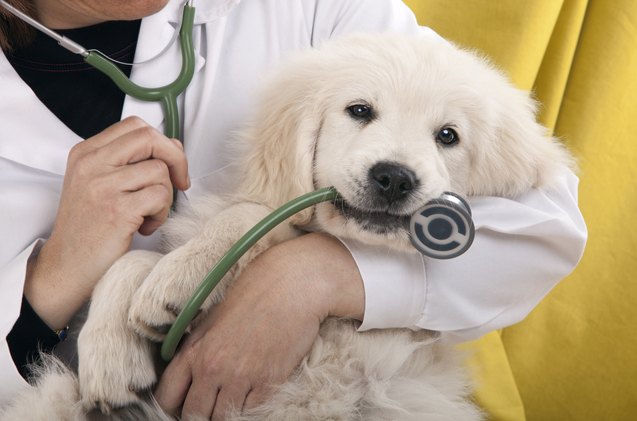What Information Does Your Dog’s New Veterinarian Need?

There are many different reasons for seeing a new vet for the first time. And no matter where you go, the veterinarian will want as much background on your pooch as possible. If you are bringing a new puppy to the vet for the first time or switching to a different vet, make sure you’re bringing along this vital information.
Related: What is a Holistic Veterinarian?
How to Give Your Vet a Thorough Medical History
Your dog can’t answer your veterinarian’s questions, so it is up to you to know what information to give your vet and how best to communicate it. If you’ve been to the vet before, your pet will already have some information on file but you should be sure to update his file if anything changes from one visit to another. If you are visiting the vet for the first time or changing to a new veterinarian, here are some of the things you’ll need to provide:
- Previous health records (this includes vaccination history, blood work, and any other tests your pet may have had in the past including the results)
- Medication history (be sure to include both past and present medications, both prescription and over-the-counter)
- Preventive medicine (this includes everything from flea and tick control to heartworm medication and more)
- Feeding information (tell your vet exactly what your dog is eating, how much, and when)
- Current problems (if your pet is currently having some kind of problem, be as descriptive as possible about the symptoms you’ve noticed)
Always err on the side of caution and provide your vet with more information rather than less. Even if something seems irrelevant, it never hurts to be thorough, especially when it comes to your pet’s health and wellness.
Related: 5 Things To Bring To Your Puppy’s First Visit To The Vet
Talking to Your Vet About Symptoms
If you are taking your pet to the vet for a specific reason and not just for a checkup, you’ll need to provide as much detail as possible about the current problem. Think about all of the changes you have noticed in your pet including changes in appetite, sleeping habits, toilet behavior, physical changes, and anything else you may have noticed. Even if it seems irrelevant, even the smallest of details can help your veterinarian to make an accurate diagnosis.
In addition to being able to take openly about your pet’s symptoms, you should also be prepared to discuss things like your pet’s lifestyle, his activity level, and anything else that may be relevant. It is important that be open and honest with your vet – never lie, even if it seems like the truth is irrelevant or could get you into trouble. You must always have your pet’s best interest in mind.
While your vet can learn a lot by performing a physical exam, you know your dog better than anyone else so you need to be an active participant at each vet visit. Learning how to give your vet a thorough medical history and learning how to describe symptoms is very important – the more information you can give your vet, the more easily he will be able to make a diagnosis. Once you have a diagnosis, you can begin treatment.

Amy Tokic, Editor of PetGuide.com, is a passionate animal lover and proud pet parent of Oscar, a Shih Tzu/Chihuahua cross, and Zed, a Japanese Chin. Her love of animals began in kindergarten, when she brought her stuffed dog Snoopy into class with her every day. Now, she writes about her adventures in pet ownership and tirelessly researches products, news and health related issues she can share with other animal enthusiasts. In her free time, Amy loves perusing used book and record stores, obsessing over the latest pet products available and chasing squirrels with wild abandon (a habit attributed to spending too much time with her pooches).
More by Amy Tokic























